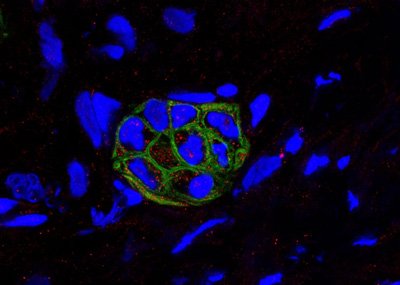Cell death mechanism may enable aggressive pancreatic cancer cells to live on
Posted: 25 April 2016 | Victoria White, Digital Content Producer | No comments yet
A study shows that most aggressive form of pancreatic cancer thrives in the presence of neighbouring tumour cells undergoing a particular form of cell death…


A new study has found that the most aggressive form of pancreatic cancer thrives in the presence of neighbouring tumour cells undergoing a particular form of “orchestrated cell death”.
The study results revolve around carefully regulated cell dell death mechanisms that, by killing defective cells or those infected by viruses, are often important cellular defence mechanisms. By studying a mouse model of pancreatic ductal adenocarcinoma (PDAC), researchers found that necroptosis in fact induced the production of a small protein CXCL1 to drive the growth of PDAC tumour cells.
CXCL1 is known to attract specialised immunosuppressive cells, tumour-associated macrophages, which reduce the ability of the human immune system to recognize and destroy cancer cells. Furthermore, the researchers say that similar events appear to occur in human PDAC.
“Our findings are the first to show that cancer cell death via necroptosis can actually promote tumour growth, as this process results in suppression of the body’s immune response against the cancer,” said the study’s senior investigator, George Miller, MD, NYU Langone Medical Centre. “What is equally significant is that these findings might also be relevant to other tumour types.”
The team went on to discover that necroptosis-induced CXCL1 alone was not enough to account for the tumour-protective environment created around the tumour cells. Dying tumour cells also release another protein, SAP130, that binds to a receptor called named Mincle, on the cell membranes of inflammatory immune cells located within the tumour environment. Activation of Mincle was found to accelerate tumour formation in mice.
Novel targets
Importantly, the researchers say, this study suggests that necroptosis and Mincle signalling could represent novel targets for potential anti-cancer drug development. Inhibiting these pathways could reverse the immunosuppressive environment created by tumour-associated macrophages and enable another type of immune cell, cancer-killing T lymphocytes, to attack the tumour.
“This study exemplifies the importance of examining cancer within the actual context in which it grows,” says Gregor Werba, MD, a research fellow in Dr.Miller’s lab. “In our initial studies, inhibiting necroptosis in PDAC cells increased their ability to grow in tissue culture. However, when we began to study the same process in mice, we were surprised to see just the opposite effect, and this was mainly due to the immune response of the cells surrounding the tumour.”
Following up on these leads, the research team plan to investigate the anti-cancer potential of a compound that inhibits necroptosis alone and in combination with immunotherapy.
Related topics
Drug Targets
Related conditions
Pancreatic cancer
Related organisations
NYU Langone Medical Centre



